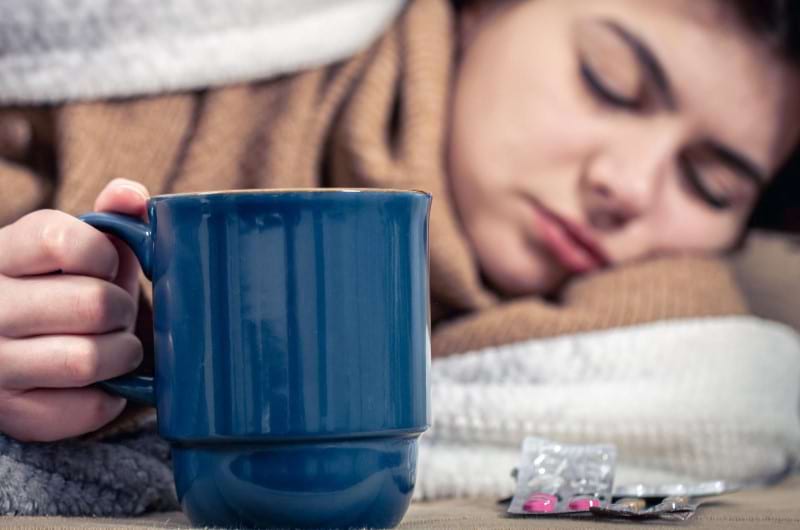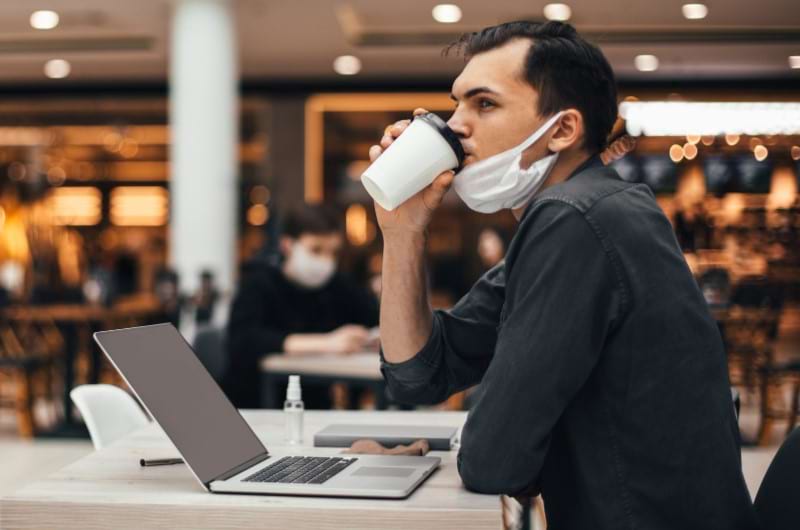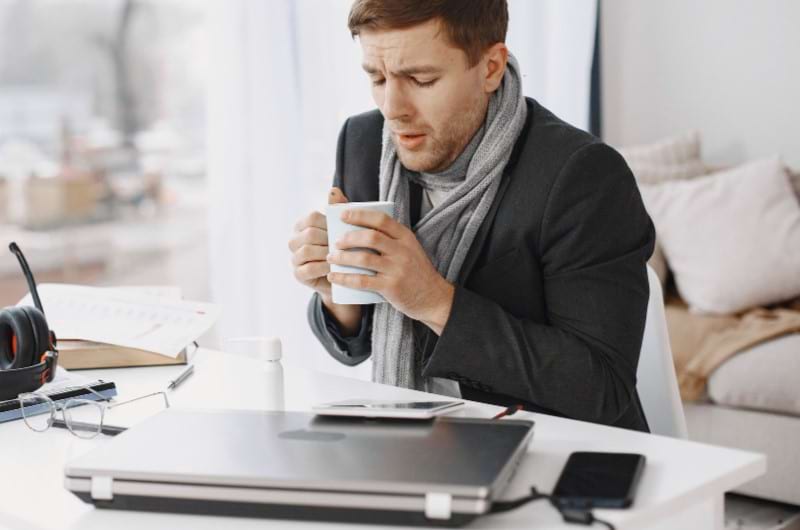It’s common to question the wisdom of caffeine consumption during times of illness, and there is a lot of mixed information regarding the decision. Educating yourself on the various factors and deciding based on your situation is crucial since each person may react differently based on their tolerance, diet, and personal health condition.
For many people like myself, the day just doesn’t really start until after that first cup of coffee.
It clears the mind, wakes the body, and makes you feel good. But for some reason, it often comes with feelings of hesitation and guilt.
Is this dehydrating my body? Will my sleep schedule suffer? Could I become dependent and unable to function without it?
Many negative thoughts and concerns associated with coffee consumption can get in the way of enjoying our cup each morning.
This is especially true when we’re already not feeling great or dealing with the flu.
Since you’re probably anxious to get your day started guilt-free, I’ll jump right in and explain why consuming coffee regularly is unsafe, but it can also help you get over your next cold (as long as it’s done right).
Exploring coffee’s impact on health
Let’s start by debunking some common myths about the dangers of the big bad coffee cup.
The negative perceptions of coffee stem from outdated studies linking caffeine to the issues discussed below.
More recent research contradicts these claims, explaining that it’s possible to include coffee in a healthy diet and that it has several benefits.

1. Dehydration
Coffee is commonly known as a diuretic with a mild dehydrating effect.
However, the dehydrating effects are minimal when paired with a healthy diet and sufficient water intake.
These negative impacts are also balanced by the water in the coffee itself.
2. Sleep deprivation
One of the most significant advantages of coffee is its energy and alertness.
The flip side of this is the concern that it prevents or disrupts our sleep.
There is mixed research on this issue, but it is generally agreed that a moderate amount of coffee consumed more than 6-8 hours before sleep has a very minimal effect on sleep quantity or quality.
It may also be possible to balance out these effects with melatonin.
3. Anxiety
A common complaint with coffee is a feeling of jitters or increased anxiety. This is very dependent on the person’s caffeine tolerance and diet.
These effects are more extreme on an empty stomach and can be significantly minimized by postponing coffee until after a good meal.
4. Addiction
The final and perhaps most significant concern regarding coffee consumption is the fear of becoming dependent upon it.
Horror stories of withdrawal migraines and extreme irritability incite this. The big factor here is quantity.
As long as you keep daily consumption at 1-3 cups, you are unlikely to experience withdrawals or other effects of dependence.
Generally speaking, there are pros and cons to coffee consumption.
But as long as certain precautions are taken, minimizing the negatives and enjoying the benefits is easy.
In fact, some of the most dangerous aspects of coffee drinks are not in the coffee itself but in the sugars and other added ingredients.
So, if you’re for a quick fix to make your cup of coffee a little healthier, consider cutting back on sugar or creamers.
It is also worth noting that people who drink coffee regularly may feel no effects at all.
The more caffeine we consume over time, the more our bodies adapt to its influence and the more it takes to get the same results.
Coffee consumption considerations when sick
So now that we have established that coffee is not as dangerous let’s explore whether the same is true when we feel under the weather.
This is a complex issue because the most common effects of caffeine are also some of the major factors in recovering from an illness: hydration, sleep, and energy levels.
This is further complicated by components like the acidity of coffee and the ways caffeine can react with different medications.
Hydration and sleep
Let’s revisit these issues since they are crucial to understanding caffeine’s effect on the body and recovering from illnesses.

The concern of dehydration is especially relevant for individuals suffering from symptoms like diarrhea and nausea.
Maintaining proper fluid levels is so crucial to our health and recovery.
As Dr. Roxanna Namavar explains, our mucous membranes “are the body’s first line of defense against viruses,” and they cannot function properly when they are not adequately hydrated.
Getting sufficient rest and sleep is equally essential in the healing process, so it is essential to avoid anything that might compromise this.
That’s why it’s so important to be careful not to consume caffeine less than 6-8 before bed.
Energy levels
We all know the know that feeling of sluggishness and lack of energy we experience when we are sick.
This is known as malaise; coffee can go a long way in minimizing its effects.
Another factor at play here is the feeling of comfort that many people associate with their morning cup of coffee.
It puts their minds at ease and positively starts the day. This can be extremely valuable to keeping spirits up during a tough illness.
Coffee acidity
One relevant characteristic of coffee is its natural acidity.
This can become problematic when consumed by someone dealing with gastrointestinal problems, especially stomach ulcers or digestive issues.
In these cases, coffee consumption can increase acid production and cause discomfort.
Coffee and medication
When considering the pros and cons of drinking coffee while sick, one of the most important factors to consider is what medications you are currently on and how they could react to caffeine.

Here are a couple of the most important ones to be aware of:
- Caffeine is known to strengthen the effects of “stimulant” drugs.
- Caffeine can interact unpredictably with antibiotics.
- There is mixed research on this topic, but caffeine may react negatively with pseudoephedrine, worsening the possible side effects like nausea, anxiety, and sleep disruption.
- Other medications to avoid combining with caffeine include Ephedrine, Theophylline, and Echinacea.
It is essential to be careful combining caffeine with any medications since each person is unique and may react differently.
So, monitor your body’s symptoms and consult a medical professional when in doubt.
Benefits of coffee consumption
Now that we have covered the many factors to consider when determining if coffee consumption is safe, let’s look at some of the positive effects of caffeine on our health.
You may be pleasantly surprised by the many benefits that come along with your morning beverage:
- Antioxidants that reduce inflammation and boost your immune system
- Antiviral and antibacterial effects that help prevent and fight a variety of illnesses and conditions
- Beneficial vitamins and nutrients like Vitamin B2 and Magnesium
- Decongestant properties that help with congestion and other symptoms when paired with proper water consumption
Research also shows that caffeine reduces the likelihood of Cancer, Type 2 Diabetes, Heart Disease, Strokes, Depression, and even Mortality, among others.
Coffee and COVID-19
Looking at COVID specifically, a recent study suggests that the chlorogenic acid in coffee has properties that guard against the virus.
Just remember to keep your daily intake at moderate levels – I know this can be a challenge with the extra time stuck at home.

Research suggests that people recovering from COVID may experience an increased sensitivity to caffeine.
Alternatives to coffee
The first alternative that should come to mind is decaf coffee since most of the side effects come from the caffeine in coffee rather than the coffee itself.
Another option that is a little less intuitive is cold brew coffee. This is a great choice for those suffering from stomach problems because cold brew tends to be less acidic than its hot counterpart.
Some other drinks that may be more beneficial when sick include tea, sports, drinks, juices, or broth.
You also can’t go wrong by keeping it simple with water – adding lemon or honey can also have some added benefits.
References
- https://health.gov/sites/default/files/2019-09/Scientific-Report-of-the-2015-Dietary-Guidelines-Advisory-Committee.pdf
- https://pubmed.ncbi.nlm.nih.gov/9443519/
- https://www.mayoclinic.org/healthy-lifestyle/nutrition-and-healthy-eating/in-depth/caffeine/art-20045678
- https://www.hsph.harvard.edu/nutritionsource/food-features/coffee/
- https://www.ahajournals.org/doi/10.1161/CIRCULATIONAHA.115.017341
- https://www.rsc.org/journals-books-databases/about-journals/food-function/
- https://www.prettyhealthynyc.com/


